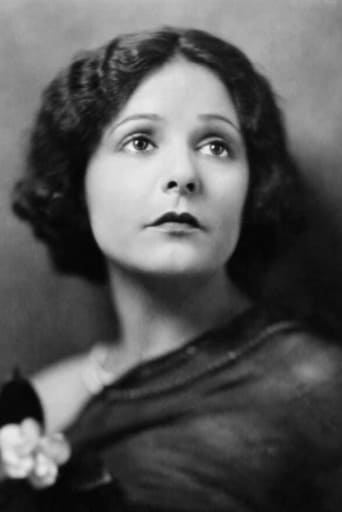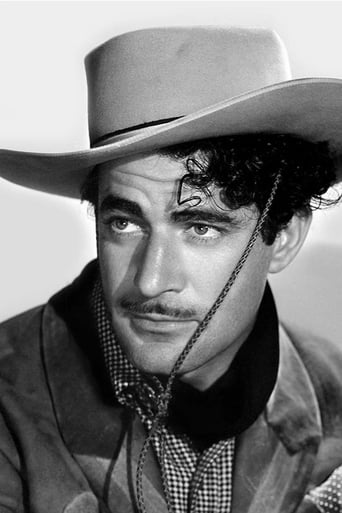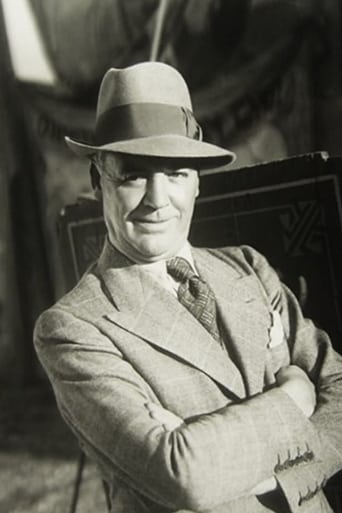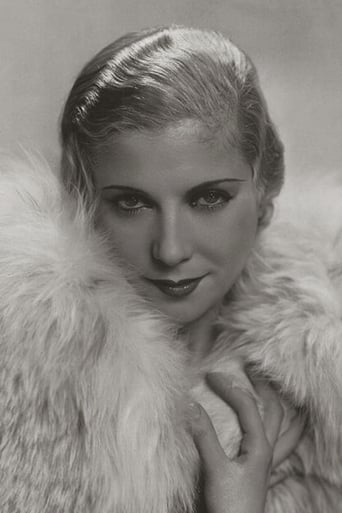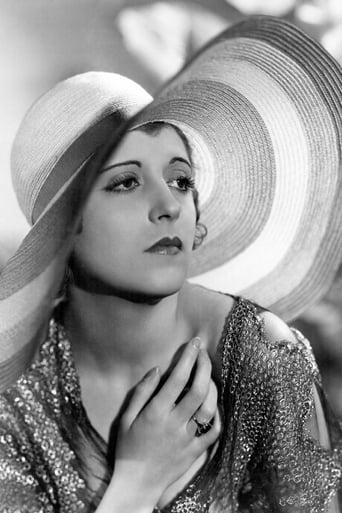Matrixston
Wow! Such a good movie.
Solemplex
To me, this movie is perfection.
FuzzyTagz
If the ambition is to provide two hours of instantly forgettable, popcorn-munching escapism, it succeeds.
Guillelmina
The film's masterful storytelling did its job. The message was clear. No need to overdo.
kidboots
"New York Nights" was one of a sizable group of straight dramas whose story was set back stage to feed (in 1929) the public's ever increasing appetite for anything connected with Broadway. Norma Talmadge had built her acting reputation on "sobs and smiles" usually as the star in spectacular costume dramas so any speaking voice she had, unless it was a duchess's, would have sorely disappointed. But would people really have been let down because Norma didn't speak in a "lah de dah" accent, after all she was playing a struggling chorus girl, Jill, who along with her husband Fred (Gilbert Roland) is desperately trying to find fame on the Great White Way.Based on the play "Tin Pan Alley" that starred Claudette Colbert and at 69 performances was hardly a success, transferred to films with a story as exciting as an empty street. This is a "behind the scenes" story but without the heartache and emotion and you don't get much singing or dancing except for the dreary "A Year From Today" which is played constantly because everyone thinks it will be a big hit - of course!! There is also a medley of performers, Al "Rubberlegs" Norman and a pair of tappers at the wild party. Fred is a bit of a ne'er do well who misses Jill's birthday because he goes on a bender - and then lies about it!! Norma is given a big emotional scene where she finishes up with "I'm going out to get MY happiness" before hitting the New York night spots with racketeer Joe Prividi who acts more and more crazy as the film progresses. Jill is happy to kick up her heels but when she finds Fred in a night court picked up for vagrancy they decide to give their marriage another go - even though she is scared of what Joe will do!!Mary Doran (mis-spelt as Koran in the credits) plays the usual trouble making chorus girl initially eager to come between Jill and Fred but now just as keen to fall in with the psychotic Joe as he plots revenge. Everything happens at the end - Joe orders his goons to stop the happy couple from boarding the train but things go wrong and Fred finds himself in a showdown with Joe on a fast moving express!!I am usually quick to embrace any early talkie but I can't get keen on this one. I disagree with the reviewer who pans Gilbert Roland's performance - I mean he is playing a weak man who in the scene where he lies to Jill, there are indications that it has happened before and this is the last straw. Norma Talmadge was okay, she "grand dames" it in her big emotional scene and while again I don't agree with the reviewer who commented on Norma's looks, I think she looks her age and not like an ambitious chorus girl, hungry for success. It would have been better with Claudette in the main role, she would have brought youth and vigour to the part. One actress who would have lifted the film if she had been given more to do was Lilyan Tashman. Her witty scenes were the film's highlight.
anches-725-976306
It is difficult for me to mark this picture as the copy I have is of very poor quality in visual and sound. I have seen Norma Talmadge in "DuBarry" and on the evidence of these two films, it certainly was not her voice that ended her career. I think it was simply a matter of her increasing age and weight. Apparently she was 34/35, but at times looks more like 50 and there is clearly a thickening of the neckline and Queen Mothering of the upper arms. A previous reviewer has mentioned the arrival of a new set of younger faces at this time (Joan Blondell and Jean Harlow, for instance),but ironically, only a couple of years after Talmadge's retirement, the big new star was a forty year old, overweight woman with just the type of accent which was supposed to have ended Norma's career, namely, Mae West. The young Gilbert Roland has very much the appearance of his namesake, John Gilbert and the same Latin charm as his friend and fellow Mexican, Ramon Novarro. As is to be expected, the film is tied down by the static microphone, but not as obviously as, say, "Lights of New York". Sadly, my copy is shorn of several minutes; there is one complete song and some musical snippets in the party scene but no sign of Al Jolson in a cameo role.From what I see, however, the film had potential which, somehow, just didn't come to fruition. Returning to the matter of "Lights of New York", not only do these films share a similar title, but even the endings are not a million miles from each other!
drednm
Interesting film based on a Broadway play (TIN PAN ALLEY) that starred Claudette Colbert.The film is famous as one of Norma Talmadge's flop talkie attempts but it's not bad at all and is a better film than her 1930 attempt (and final film) as Madame DuBarry.Talmadge plays a show girl married to a song writer (Gilbert Roland) but everyone is involved in the Broadway night life and endless parties. Plus Talmadge is being pursued by a gangster. Talmadge leaves her husband after he spends the night with a floozie. She ends up as the gangster's moll but soon gets tired of the life.She runs into Roland (on the skids) later and tries to rekindle her relationship but as they attempt to leave wicked NYC for the country they get involved in a botched gangland murder.This film proves that Talmadge had a perfectly good voice (she even sings a little), not overly trained and unnatural as she was as DuBarry. She's also pretty good in a the part and it's fascinating to finally see this great star in a "modern" role. Roland isn't bad as the husband and has surprisingly little accent.Lilyan Tashman is Norma's pal, Roscoe Karns in the music partner, John Wray is the gangster, Mary Doran is the floozie, Jean Harlow has a bit part as a party guest, and Al Jolson makes a cameo and sings a song but it's all cut from the short version of this film that I have.Another curiosity from the transition era. Why would this film have flopped?
arthursward
A police wagon speeds through pre-dawn Manhattan streets as the credits roll. The siren screams, there is no music. Two policemen rouse a doctor to a stricken man, he's dying. "Who did it, Dopie?" Cut to a tuxedoed silk hat in the back of a chauffered limo. "Gee, boss, that was a nervy hit." An I. O. U. for $25,000 payable to Dopie Brown is being torn, "Somebody's always gotta pay for a fourflush." A cackling John Wray (as Joe Prividi) chews the I. O. U. pieces into a spitwad, then flings it out the window. Joe then breaks into a flower shop and takes a stolen bouquet to "his goil".Norma Talmadge as Jill Deverne is the object of Joe's affections. Leaning into a clever two shot in a dumbwaiter, she reminds her Broadway show's producer that her husband might object. Jill walks the knife edge between offending her benefactor and encouraging his romantic inclinations. She is polite, yet firm. In another room, her husband, Fred (Gilbert Roland) works on a tune with buddy, Johnny (Roscoe Karnes). Fred's stuck for a closing lyric and Jill enters with a plum, then falls into his arms. In one scene, Gilbert Roland and Norma Talmadge exhibit their fine voices and sparkling, well-honed chemistry. Roland and Talmadge had been teamed in THE DOVE (1927) and A WOMAN DISPUTED (1928) and here, the magic pops out of the screen. Norma has several close-ups that display her acting mastery. Halfway through the first reel you'll be in love with this movie.Lilyan Tashman, as Jill's friend Peggy, has a backstage scene where her beauty is truly revealed. With her hair hidden by a cloche-like headpiece, Ms. Tashman's face is revealed to be the most beautiful ever photographed. Also revealed, in this pre-code picture, is her body. Were it not for the wings of a bird seemingly painted on Lilyan's front, all of her modesty would be lost.The direction is excellent, tightly handled by Lewis Milestone right before he started ALL QUIET ON THE WESTERN FRONT. The pace is rapid and only relents for one brief reconciliation between Jill and Fred. They plot their getaway in a booth in a diner. As they hash out the final details, the camera dollies slowly to the next booth, chillingly revealing Joe's chauffer eavesdropping.Ray June keeps interesting shots coming throughout the 64 minutes my print ran. And this is where a discrepency arises. The runtime is given as 108 minutes (IMBD), then a release footage of (approx.) 7380 ft (IMDB). AFI lists the release footage at 7447. As both footages run 81 or 82 mins, one wonders what happened to the rest of the film. [I know film shrinks, but that's rediculous] I can find only evidence of one song ever having been in the picture.73 years after its release, it is impossible to determine what sank this wonderful film at the box office. But, sank it did. Impossible to ascertain whether it failed to be promoted, what the rumor mill ground out or just how the public expected silent film stars to sound. After one more picture, the glittering career of Norma Talmadge, a star that shone so bright as to bring two sisters into the arc light, would be extinguished. Only a year later, as writer Joseph L. Mankiewicz noted, the end of the silent era was typified by Norma Talmadge leaving the Brown Derby and telling a gang of autograph hounds, "Get away, you little b*****ds, I don't need you anymore." And thus fell silent a splendid, promising new talking picture career.At least we have this terrific movie to remind us of how good silent film technique could be in talkies.
